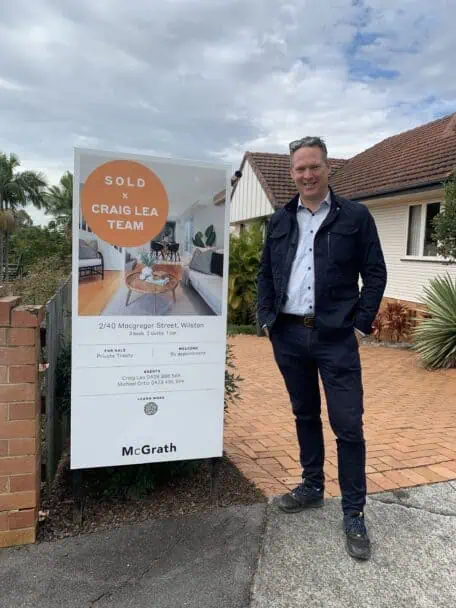Welcome to Property 101. When it comes to choosing your home or investment property, one of the major decisions is selecting the type of property that suits your needs best. You’ll have the option of a unit or apartment, townhouse or a detached house. Each type of property has its own set of advantages and disadvantages. It will be important to consider your individual requirements before making this big decision and in this blog post, we’ll help you explore the key considerations when choosing between a house versus a townhouse, we’ll consider the options of units in another blog.
Factors to consider when choosing between a house versus townhouse
Before diving into looking at properties, there are several factors to consider when choosing between a house or a townhouse. These include:
- your desired location;
- the size of your family;
- your budget;
- your willingness to pay body corporate fees;
- the importance of car accommodation;
- your preference for a yard;
- whether you have pets;
- your thoughts on sharing facilities like a pool or gym;
- your potential future need for upsizing or downsizing;
- your willingness to undertake renovations;
- your non-negotiables;
- your desire to own land;
- your tolerance for close neighbours;
- and your long-term plans for occupancy or rental purposes.
House versus Townhouse – Which is better to buy in Brisbane?
Detached House
A detached house refers to a standalone dwelling where the buyer owns the land on an individual title. In Australia, detached houses are the most popular property type, with 70% of properties in Australia being seperate houses, according to the 2021 Australian Bureau of Statistics figures.
Advantages of buying a detached house:
- More space: Houses usually offer more room compared to townhouses, making them suitable for larger families or those seeking future expansion.
- Outdoor space: Houses typically have more land, allowing for gardening, kicking a ball around with the kids, space for a swimming pool etc.
- Privacy: Living in a house often offers more privacy, as you’re not in as close proximity to your neighbours.
- Flexibility: In a house, you have greater freedom to renovate and make changes to the land and improvements, without having to seek approval from a body corporate.
Disadvantages of buying a detached house:
- Higher expenses: Living in a house generally entails increased utility bills and higher costs of maintenance and furnishing due to the larger space.
- Greater maintenance responsibilities: Houses require regular upkeep, including lawn mowing, gutter cleaning, tree trimming and general repairs, which can be time-consuming and labor-intensive.
Townhouse
A townhouse combines aspects of both that of a house and a unit and is often viewed as the middle option between the two. It can be a low set or multilevel property designed to resemble a house, but with a body corporate, meaning the land ownership is shared with the other owners. In Australia, townhouses account for 13% of housing market, whilst units and apartments make up 16% according to the 2021 Australian Bureau of Statistics figures.
Advantages of buying a townhouse:
- More space than units and apartments: Townhouses more often than not span multiple levels, providing more room compared to units. They can accommodate families or individuals who desire extra space without the full size of a house.
- Privacy: Townhouses offer a similar level of privacy to houses and typically have either one or two shared walls with neighbours.
- Relative affordability: While townhouses are generally more expensive than units and apartments, they tend to be more affordable than detached houses, making them an attractive option for those seeking a balance between space and cost.
Disadvantages of buying a townhouse:
- Potential noise issues: As townhouses are typically attached or in close proximity to other townhouses, noise from your neighbours may be a greater issue than with a detached house.
- Shared walls and body corporate fees: Townhouses often share walls with neighbouring townhouses on one or both sides, which means you may have less control over noise disturbances and potential maintenance issues. Additionally, townhouses are more often than not part of a body corporate, requiring you to pay regular fees to cover shared expenses such as maintenance, insurance and common area upkeep. When buying into a property with a body corporate, there is additional important due diligence required.
House Versus Townhouse – Additional differences
When deciding between a townhouse and a house, it’s important to consider various factors such as your lifestyle preferences, financial considerations and future plans. Here are some additional thoughts to consider:
Capital Growth:
- Houses historically have outperformed townhouses in terms of capital appreciation due to their larger land component.
- Townhouses, while experiencing less growth, can provide good returns in sought after locations.
Rental Returns:
- Townhouses generally provide better rental returns (yield) due to their lower purchase cost and often strong rental demand.
- Houses may have lower rental yields, resulting in higher out of pocket expenses (negative gearing) for investors.
Maintenance:
- Houses require more maintenance, including painting, gardening and repairs.
- Townhouses typically have fewer maintenance requirements, offering a low maintenance lifestyle, as the body corporate look after many aspects of the townhouses and the common area.
Flexibility:
- Houses provide greater flexibility for renovations and extension.
- Townhouses have restrictions on changes that are governed by the body corporate bylaws.
Privacy:
- Houses offer greater privacy as they do not share common areas with multiple occupants.
- Townhouses may have shared walls, compromising privacy to some extent.
House Versus Townhouse – Things to consider before buying
Your Goals:
- Determine whether your purchase is for personal living or investment purposes.
- Clarify your objectives to align your choice with your desired outcomes.
Proximity to Brisbane CBD:
- Consider how close you want to be to the Brisbane CBD and the impact on affordability.
- Your budget and your requirement to live within a certain distance to work or the CBD, will influence the type of property you can afford.
Financial Considerations:
- Assess your budget and affordability for houses or townhouses in preferred locations.
- Take into account the potential costs associated with owning and maintaining each property type.
Lifestyle Preferences:
- Evaluate your need for space, outdoor areas and privacy.
- Consider your willingness to handle maintenance responsibilities or pay body corporate fee contributions.
Future Plans:
- Anticipate your future needs, such as upsizing or downsizing.
- Assess the potential for rental demand if the property is an investment.
Choosing between a house versus a townhouse requires careful consideration of your goals, budget, lifestyle preferences and future plans. While houses offer more space and potential for greater capital growth, townhouses provide a balance between capital appreciation and rental yield, with lower maintenance requirements. By evaluating these factors and asking yourself the relevant questions, you can make an informed decision that aligns with your unique circumstances. Seeking professional advice, such as engaging one of our professional Buyer’s Agents in Brisbane, we can help you navigate the property market and find your dream property.
If you are considering purchasing a home or investment property in Brisbane or South East Queensland and would like the assistance of an experienced Brisbane Buyer’s Agent that can help you find the perfect property, that meets all your requirements for the right price, please don’t hesitate to contact us.
Feel free to contact us via email admin@templetonproperty.com.au or call 0418 159 993
We look forward to hearing from you.
Sam Price, Buyer’s Agent and Director – Templeton Property.

